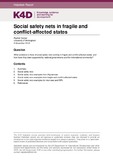Social Safety Nets in Fragile and Conflict-Affected States
Abstract
This rapid review synthesises evidence on social safety net in fragile and conflict-affected states and how they have been supported by national governments and the international community. First section will discuss about the scope of social safety net and followed by examples from Afghanistan. Second section discusses about social safety net examples from Fragile and Conflict-Affected States with main focus of Mali, South Sudan and Yemen. Final section discusses about examples of social safety net for returnees and IDPs, mainly in Afghanistan, Iraq, Sudan and Syria. The country examples presented in this review illustrate that even if government-led social protection programmes exist, for example national cash transfer programmes, fragility and conflict affects and can destroy their ability to function. For example, Yemen’s Social Welfare Fund delivered cash transfers to 1.5 million households until early 20151. Pre-existing national programmes and systems can be useful to donors and implementing agencies delivering social protection even if they are not functioning. For example, pre-existing beneficiary lists can make beneficiary targeting easier. However, weak institutions, low institutional and absorptive capacity and damaged infrastructure can pose implementation challenges (Holmes, 2010, p. 4). For example, limited government ownership of a World Bank financed project to improve pension administration in Afghanistan slowed the project’s progress (World Bank, 2018b, p. 23). Humanitarian responses often create new emergency structures as national or local institutions are not able to respond a crisis (Al-Ahmadi & de Silva, 2018, p. 23). However, in Iraq, this may have led to duplication as both the Iraqi government and humanitarian agencies were providing cash transfers to IDPs (Smart, 2017).
Citation
Cooper, R. (2018). Social safety nets in fragile and conflict-affected states. K4D Helpdesk Report. Brighton, UK: Institute of Development StudiesIs part of series
K4D Helpdesk Report;496Rights holder
© DFID - Crown copyright 2018Collections
- K4D [937]

